Martin Edwards's Blog, page 8
May 19, 2025
CrimeFest 2025 - the end of an era
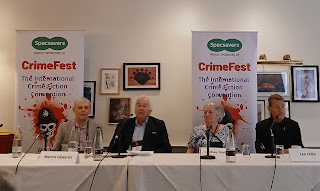
I'm just back from Bristol after yet another excellent CrimeFest. Sadly, it's to be the very last one, although there was an announcement at the banquet by Barry Ryan which suggested that this great festival may re-emerge in some form in future. Fingers crossed! But in the meantime, warmest congratulations to Adrian Muller and Donna Moore for everything they have achieved. It really has been a blast. I've attended since the start, and only missed one, which clashed with a lecture trip on the Queen Mary: there had to be a compelling reason to miss out! So this post is a blend of reminiscences and photos about the weekend, and CrimeFests past. Starting with a proud moment above as part of the Diamond Dagger panel and with my fellow ex-chairs Maxim Jakubowski and Vaseem Khan below.
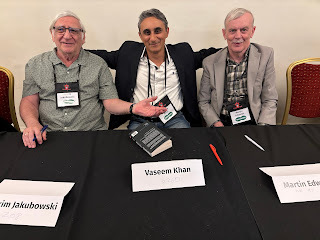
I've got so many happy memories from CrimeFest over the years, far too many to mention here. Interviewing Peter Lovesey was one highlight, being interviewed by Donna, together with Robert Goddard, when I was guest of honour three years ago, was another. Having a drink in the bar with the film director Mike Hodges and discussing Get Carter. Meeting my agent James Wills for the first time. Parties with publishers. Launching The Life of Crime. Lunches and dinners with friends such as Ayo Onatade, Michael Ridpath, Ann Cleeves, and John Curran. Presenting the Diamond Dagger to Peter James and chatting with Martina Cole.
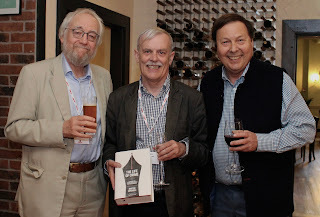
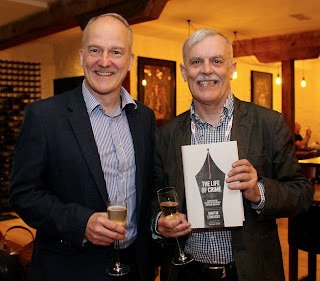
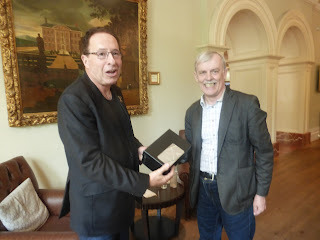
And on a perhaps self-indulgent note, I've been lucky enough to pick up quite a few items of lovely Bristol Blue Glass. Winning the CrimeFest H.R.F. Keating award three times, the first presented by Harry Keating's widow Sheila. Being presented with the inaugural CWA Margery Allingham short story award. Two Criminal Mastermind wins. Quite a few pub quiz wins, too. Plus three eDunnit award shortlistings. But of course, what is most importantly of all is the friends I've met and made. All of them have contributed to this being a must-attend event in my calendar.
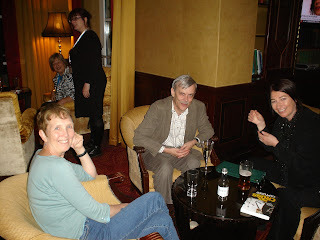
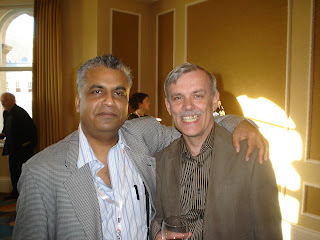
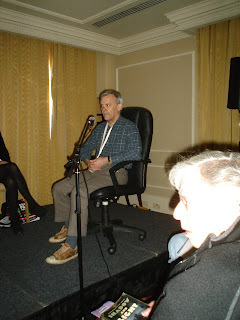
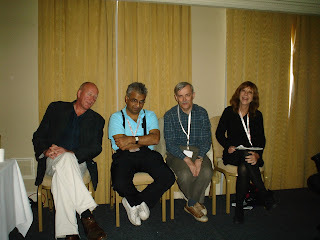
I co-edited with Adrian the anthology Ten Year Stretch, celebrating the festival's first decade, in which my daughter Catherine translated a story by Maj Sjowall, whom I was delighted to meet, and I was also delighted to contribute a new story, 'The Butler', to the new anthology, brilliantly titled Leaving the Scene.
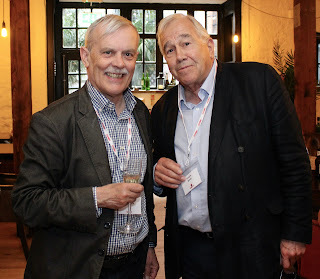
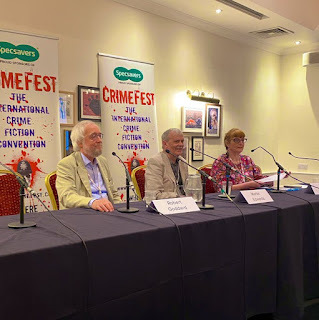
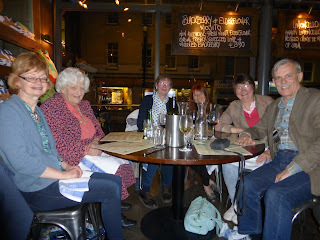
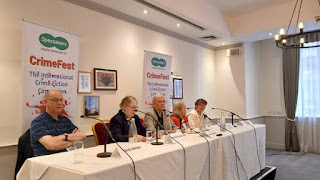
This year began on Thursday with my moderating a panel about Authors Remembered, with David Whittle, Katherine Hall Page (an MWA Grand Master, lovely to spend time with her and her husband Alan again; we'd not seen each other for ages), Christine Poulson, and Dolores Gordon-Smith. (My author, by the way, was Martin Russell.) A convivial dinner with Simon Dinsdale, David Brawn, Sarah Dunnakey and others was followed by Peter Guttridge's final pub quiz. And we did manage to snaffle the prize. Then a good chat in the bar with Peter and Mike Stotter.
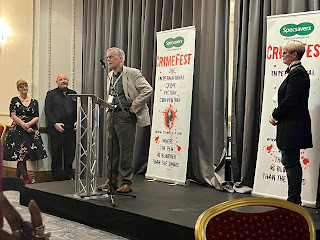
On Friday I did some sightseeing, but also had lunch with Bryan J. Mason and Caro Ramsay and her husband and also bumped into more CrimeFest regulars such as Sue Lord and Zoe Sharp. There was a fun book signing for Leaving the Scene and a chance to catch up with Vas Khan and Maxim Jakubowski. Then James Wills and I recreated our original dinner encounter, recalling how I pitched to him the idea of The Golden Age of Murder...A great evening.
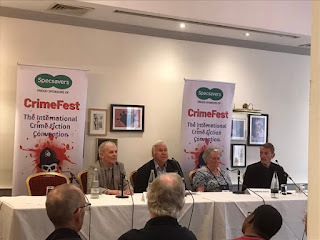
Saturday was busy and I had the huge pleasure of meeting Mark Gatiss for the first time before the Diamond Dagger panel. This was a wonderful standing-room-only occasion moderated by Simon Brett and including Lee Child, Lindsay Davis, and me. We also had the chance to pay tribute to the late Peter Lovesey, and also to feature John Harvey, who was due to attend but unable to make it. Then I recorded a podcast, about which more in the future, and there was the Playing Dead anthology panel with Simon, Ruth Dudley Edwards, Alison Joseph, Len Tyler, and Kate Ellis. The banquet was as good as ever - with Cathy Ace bringing events to an end with great style (as the photo shows, I'd had a chance to catch up with her and her husband in the sunshine earlier!). There was a chance to chat with people like Jeff Siger and Ayo Onatade and to meet Sara Lodge, whose book on Victorian female detectives I discussed here last November.

Another panel to kick off Sunday morning, about history-mysteries, with Helena Dixon, Luke McCallin, Sarah Williams, and Dolores, was a lot of fun. But then, because of the nightmare of train cancellations, I had to say my goodbyes. Yet the journey back was great, because luckily for me, Dave Penny offered to give me a lift home and I was glad to get to know him much better - a very interesting companion.
All good things come to an end, but I must say that CrimeFest has been a very good thing. And I'm grateful to everyone who has made it so special to me for so long.
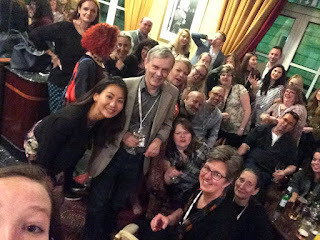
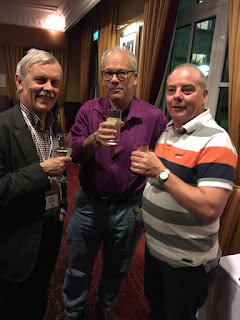
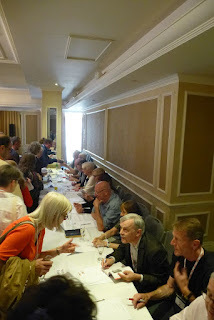
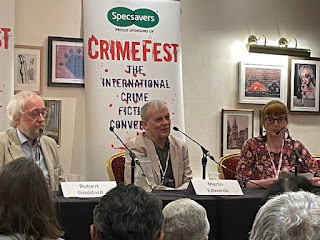
May 16, 2025
Forgotten Book - Fetish, aka A Personal Possession
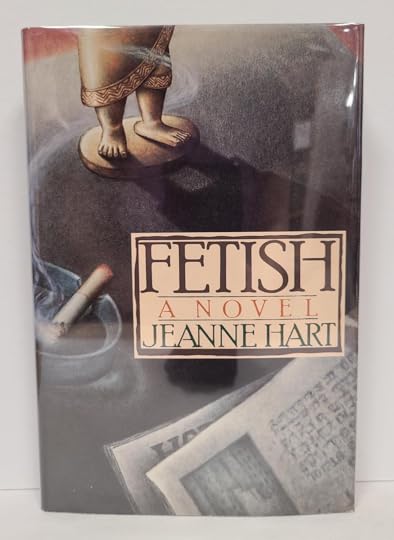
My copy of Jeanne Hart's 1987 novel Fetish, the original American edition, is inscribed (though they are not named) to Robert Barnard and his wife Louise: 'May 1988: For my favourite mystery writer and his wife'. She also covered the jacket blurb with a post-it note saying: Please ignore the blurb, it's dreadful!' In 1989, the book was published in the UK under the Collins Crime Club imprint, with the title changed (for reasons we can guess at!) to A Personal Possession. Whether Bob Barnard introduced Jeanne Hart to Elizabeth Walter, for years his editor at Collins, I don't know.
Fetish is a debut novel and it did well. The book was shortlisted for a Macavity award for best first novel and the UK edition reached the shortlist for the John Creasey Dagger. My copy bears an encomium from Ruth Rendell, no less: 'This is a truly original work. The idea behind the plot is clever and very unusual and has the effect of immediately riveting the reader's attention...It is a very accomplished piece of work.' High praise - and, in my opinion, it is well merited.
Three women friends, Zora, Sally, and Eileen, are wondering what to do with their lives. As Zora says: 'At our age, who wants a husband? They wind up with midlife crises and heart attacks and you're worse off than before.' But they decide they'd be interested in sharing a man - so they advertise for one. As well as the predictable crazy people, those who reply include one man whom they find appealing. There is a meeting - but some time later, Sally winds up dead - battered to death with an objet d'art, a brass stone fetish figure.
The detecting is undertaken by a likeable (and very happily married) cop called Carl Pedersen and his inquiries turn up a whole host of suspects. The structure of the story is quite unorthodox, and the prose is high-calibre. Above all, this is a story told with striking and impressive economy. I liked the plot and the characterisation and it's a book that will stay in my mind.
Jeanne Hart only published three more novels, two of them featuring Pedersen. She was born in 1919, so she started late, and she died in 1990. The brevity of her career means that her name is now little-known. But she was, I think, a writer of quality.
May 14, 2025
Cutter's Way - 1981 film review
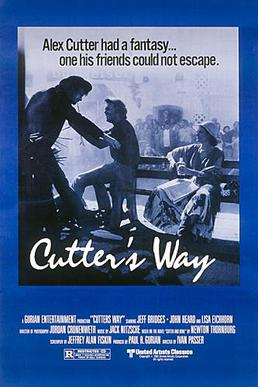
Cutter's Way is a terrific film based on a novel by Newton Thornburg. The book, which I reviewed on this blog is called Cutter and Bone and I don't think that changing the title for the film was necessary. The script, which won an Edgar for Jeffrey Alan Fiskin, changes some key elements of the book, including the under-stated (and very chilling) finale, but it works well. The director, Ivan Passer, also did a very good job.
The cast is superb. Jeff Bridges is at his best playing Richard Bone, the good-looking drifter who thinks he has seen someone dumping a young woman's body in a trash can. John Heard delivers a powerful performance as Alex Cutter, the severely disabled Vietnam vet who is psychologically damaged by his life experiences. Lisa Eichhorn plays Mo, Cutter's alcoholic wife (whom Bone has always adored) and she handles a challenging role brilliantly. When Cutter decides that the murderer is a rich and powerful local man, he hatches a blackmail plot. Does he want money or justice, or both? Or does he simply want a reason to go on living?
The studio that made the film lost faith in it and gave it little marketing support. Initial reviews were negative - amazingly, to my mind - but before long its quality was recognised. The film isn't quite as subtle as Thornburg's novel (which I think is as good as the very best of Chandler and Hammett, although it's very different from their books), but the strong characterisation and accomplished acting mean that it maintains a firm grip from start to finish.
I admire the way both the film and the novel combine in-depth, credible characterisation with a searing look at the sleazy compromises of post-Vietnam American society while delivering thoughtful, high-calibre entertainment. Both film and book are masterly and I'm surprised that they are not discussed more often. If you aren't familiar with them, you'll have gathered that I recommend them unreservedly.
May 12, 2025
An Englishman's Castle - 1978 TV review
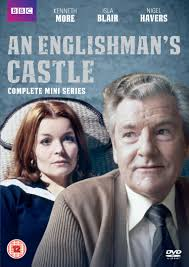
Back in 1978, I began my first 'proper job', having previously worked for six months in a factory prior to university. I had no money to spare, so I couldn't afford a television set - that took a year of saving up, strange as it seems today - so I had no idea what was being shown on TV. That explains why, when I came across An Englishman's Castle on YouTube, I'd never heard of it. But what a great discovery!
It turns out to be a three-part series, written by Philip Mackie - an excellent screenwriter - and starring Kenneth More as Peter Ingram, writer of a TV soap opera set during the war. We begin by seeing a scene being recorded and it's therefore a while before it becomes clear that An Englishman's Castle is actually an example of alternative history - the Germans have won the war.
This programme is outstanding. I really enjoyed it and admired the brilliant economy of Mackie's writing. There's a lot of meat in the story - nowadays the TV companies would pressurise the writer to turn it into about a dozen episodes, if not more. But the pace with which the story develops means that, unlike so many contemporary TV series, this one is gripping from start to finish.
More is at his very best, while Isla Blair as his lover is very good and Anthony Bate makes a convincingly slimy TV controller. The cast also includes the young Nigel Havers and Frederick Treves. The cleverness of the story is that so much is conveyed by implication - the violence is offscreen, and so is the developing insurgency. And the script makes very good points about the abuse of power and antisemitism without being unsubtle. And as a bonus, the theme music is Chi Mai by Ennio Morricone. A few years later it became a big hit as the theme to a series about David Lloyd George.
May 9, 2025
Forgotten Book - Death in Ambush
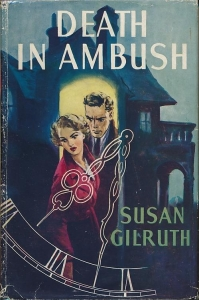
Death in Ambush by Susan Gilruth is to be published as a British Library Crime Classic in the run-up to Christmas this year. It's described on the cover as 'a lost Christmas murder mystery' and this is true enough. At the time of writing, there isn't a single copy of this one available for sale, anywhere in the world.
Inevitably, this prompts the question - is it any good? And my answer is - yes, definitely. I expect this book to become a popular title when it hits the shelves, because it ticks a lot of boxes so far as vintage crime fans are concerned. This is a village poisoning mystery with a lively female narrator, Liane 'Lee' Crauford, who has come to stay with her friends the Sandys family in the run-up to Christmas and finds herself, rather to her delight, embroiled in a murder puzzle.
A particular reason for her delight is that the official investigation is led by a Scotland Yard man, Hugh Gordon, whom she met in Gilruth's first book. It's obvious that Lee and Hugh have a thing for each other; indeed, they make surprisingly little effort to hide the fact. What is interesting and unusual about this for the time is that Lee is married - her husband Bill is away on a training course, so unable to join her at Staple Green until Christmas.
I'm grateful to both Barry Pike and Jamie Sturgeon, both of whom are fans of Gilruth, for giving me information about her and her novels. I'm not going to anticipate my introduction to the new edition in any detail, but suffice to say that this book dates from the early Fifties and was the second of seven books featuring Lee and Hugh Gordon and charting their developing relationship over the years. Gilruth's last novel came out in 1963, but on the evidence of this book, she doesn't deserve the obscurity into which she's fallen.
May 8, 2025
Publication Day!
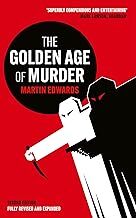
Weirdly enough, I have no fewer than four different publications to celebrate today. Let's start with The Golden Age of Murder, the new and much-expanded second edition marking the tenth anniversary of the original publication of the book. This is a book which is very dear to me, and it made a big difference to my writing career.
I'm very glad to say that the first review is already in, from Paul Burke on Crime Time FM, and he has this to say: ‘A cornucopia of crimethat fascinates and beguiles, written with Edwards’ usual flair, enthusiasm,and rigour. Every serious British crime fan should probably have a copy ontheir shelf. Open this book anywhere, and you can find a gem.’ Very nice!
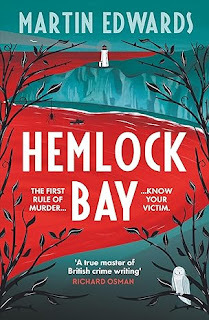
Today also sees the publication of my first ever obituary written for a national newspaper. I've long fancied writing about an obituarist, but I was gratified when the Guardian asked me to write about my dear friend Peter Lovesey. My tribute to him is here.
And last but perhaps not quite least, today is publication day for my latest free monthly newsletter. If you'd like to subscribe, you can do so here: https://substack.com/@martinedwardsbo...
These moments, when all the effort of writing turns into the reality of publication, are always precious. So you can bet I'll be celebrating extra vigorously tonight!
May 7, 2025
The Comfort of Strangers - 1990 film review
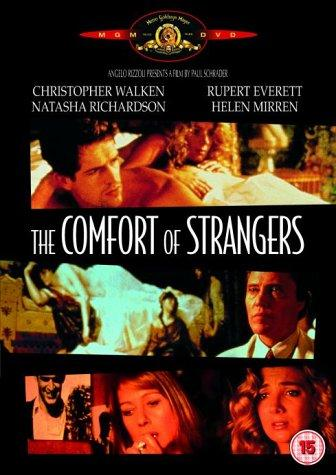
The ingredients of The Comfort of Strangers are top-notch. The screenplay is based on a novel by Ian McEwan and written by Harold Pinter. The director is Paul Schrader. The cast is headed by two couples, Colin and Mary, played by Natasha Richardson and Rupert Everett, and Robert and Caroline, played by Christopher Walken and Helen Mirren respectively. The setting is Venice, at its most beautiful and mysterious. What more could one want? Well, perhaps a greater sense of satisfaction at the end...
There's a creepiness about the story that is very typical of McEwan's early work. I can well remember, as a student, haunting Blackwell's Paperback Shop on Broad Street in Oxford, and studying the latest books intensively, while wondering if a novel of mine would ever appear on those shelves (I'm happy to report that, many years later, I did see my own books in the shop, although alas it bit the dust quite a long time ago). Picador paperbacks I found very enticing, but I didn't have the funds to buy more than one. The book I chose was McEwan's collection of short stories, First Love, Last Rites. And very macabre some of those stories were, too. He wrote them as part of his literary apprenticeship, but they do show his talent quite clearly.
So he's a writer I've long admired, even though I've not read the book on which this film is based, and I'm not sure about how much it differs. This is a slow-moving movie, and the lack of pace that, on the page, may serve to build menace and tension, seems a little overdone. Colin and Mary are a very attractive couple, but they have a relationship that is slightly fraught, partly because Mary seems rather naive, partly because Colin is uninterested in her children from a previous relationship.
Someone is taking photographs of them without their knowledge. Why? And why is a rather strange man (Robert) taking such an interest in them? It takes a long time - too long, I'd say - for the answers to become clear, and towards the end, there's an act of shocking violence that I'm not sure is adequately foreshadowed. Nor was I convinced by the final scene. But it's a thought-provoking film. Unsatisfactory in some respects, but interesting nonetheless.
May 5, 2025
Returning to the Scenes of the Crimes
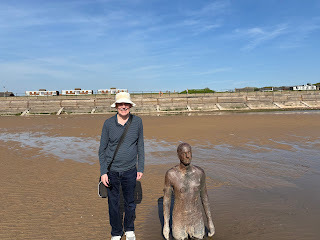
The weather in England has been consistently - and uncharacteristically, it must be said - lovely for a while now. This may be as good as summer gets this year for all I know, so I've been getting out and about in between spells on the PC, working away at Rachel Savernake's latest adventure and preparing my May newsletter, which is due out soon - please do subscribe if you're interested in more info about crime writing and reading: https://substack.com/@martinedwardsbo...
I've had a couple of trips which have brought back welcome memories of writing my Harry Devlin novels. (Incidentally, I hope to be able to announce some news about the Harry Devlin books, when I get the go-ahead from my agent.) First, as the above photo shows, I made a trip to Another Place on Formby Beach, the amazing Antony Gormley art installation which had a significant presence in the eighth Harry Devlin novel, Waterloo Sunset, which I think is one of the best. I remember going there to do a publicity photo, with me in profile besides one of the statues' heads. I also recall being alarmed by news that Sefton Council were minded to remove the statues shortly before the book was due to be published. Thankfully, sense prevailed and seventeen years later, the statues are as fascinating and thought-provoking as ever.
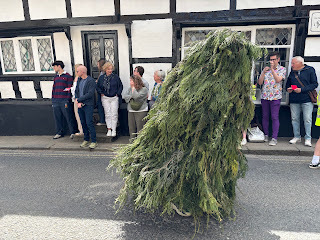
On Saturday, I made a pilgrimage back to Knutsford, the town of my birth, for the Royal May Day celebrations. When I was growing up a few miles away in Lostock Gralam, a trip to the big funfair was a great treat, but these days I'm more interested in the parade, which is as good as any I've seen in England.
It's still led by Jack in the Green, who gets a mention in Suspicious Minds, the second novel I published, way back in 1992. In that book, Harry goes to Knutsford to interview a woman who is based in the town and thinks about the parade. Suspicious Minds is an early example of my novel writing, but when I reread it a few years ago (not something I often do) I felt it held up pretty well despite the passage of time. And it was fun to be reminded of this early effort on a sunny day in a lovely part of the world.
May 2, 2025
Forgotten Book - Peril at Cranbury Hall
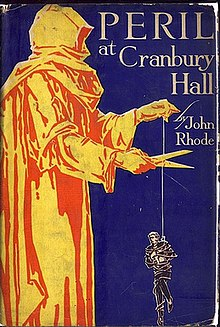
A couple of years before Agatha Christie published Peril at End House (1932), her Detection Club colleague John Rhode was responsible for Peril at Cranbury Hall. With one exception, the similarity ends there, though. Whereas Christie's novel is a splendid example of her craft, with some very clever plotting, and is well regarded to this day, Rhode's book long ago fell into obscurity.
This is a pity, because it's a readable story. One aspect that I really liked was that Cranbury Hall is home to a medical scam, in which a group of unscrupulous men take advantage of the gullibility of the 'worried well', offering a phoney cure for fatigue, by way of a vaccination. Rhode's description of the way that naive people with money to burn will fall for all sorts of scams in the search for better health or a better appearance, is very good. And of course, the central point that he makes remains true to this day.
At the heart of the scam is an unscrupulous chap called Oliver Gilroy. Oliver has just been released from prison, after serving seven years for fraud. (Compare the way certain fraudsters are treated nowadays by our legal systerm) He is bent on making big money fast, and he is ruthless about securing the collusion of a number of people who fear that he may disclose their secrets.
However, it soon becomes clear that someone wants Oliver dead. A number of attempts to kill him are near-misses (compare the story that Nick Buckley tells Poirot about the attempts on her life in Peril at End House: the explanation, however, is utterly different). Dr Priestley becomes interested in the case, and for once stirs himself into physical action, travelling to Ostend with his long-suffering secretary Harold Merefield during the course of his investigations. This is a carefully structured story, and one I enjoyed reading.
May 1, 2025
Hemlock Bay and the eDunnit award
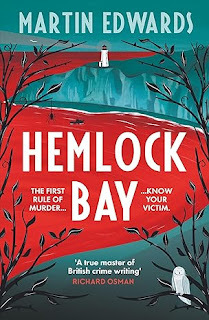
I'm as pleased as Punch that Hemlock Bay has been shortlisted for the eDunnit award for best crime novel, to be announced at CrimeFest 2025 in Bristol later this month. The other writers on the short list include two pals of mine from the United States who are gifted writers, Laurie R. King and Peter Swanson. Congratulations to all the nominees!
This means that novels in the Rachel Savernake series so far have been nominated for five awards. I find this hugely gratifying, not least because series novels are sometimes overlooked by some award judges. And given that I'm currently working on book six in the series, this level of recognition is very motivating. Suffice to say that writing about Rachel and her entourage continues to excite me, so I hope it will also excite others to keep reading. Or perhaps to broach the books for the first time...
I'm acutely aware that it's one thing to be shortlisted for an award, another thing to win. But I also know (having very recently been involved in co-judging a competition run by Murder Squad, as well as from many other experiences over the years) that the margins of judgement in these matters are fine and inevitably a bit subjective. So, as I often say to other authors who are shortlisted for the first time, it's a moment to celebrate, whatever the eventual outcome.



